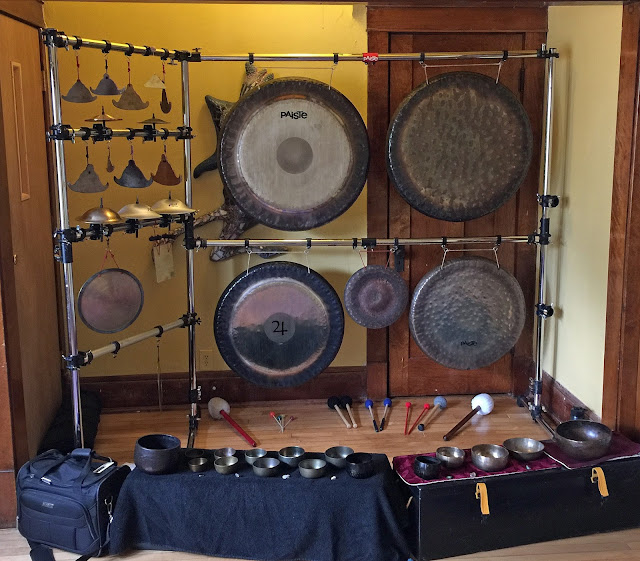Finding Your Own Voice
There are literally thousands (maybe even tens of thousands) of Gong players out there today. What makes you stand out from all of them? Really. What makes what you so different from the masses playing around the world everyday?
These are very important questions to ask yourself. I see so many people who just do indiscriminate banging on their Gongs and think they are doing something amazing. Well, they are not. And they are not any different than thousands of other people doing the same thing at the same level of mediocre competence and creativity.
A short Quiz
List you 3 favorite musicians/singers/bands. Then ask yourself why you like them and what makes them musically stand out to you above all the similar artists. Go ahead and do this. I'll wait.
A Short Answer
Whether they are megastars filling arenas, or hometown musicians filling bars & clubs, they most likely have what Bowie called sound & vision. Along their career path, they developed a musical vocabulary, which they most likely kept refining, but it became their core identity.
What makes a guitarist like Eric Clapton different from Eddie Van Halen, or hundreds of other famous guitar players? Each guitarist developed their own unique vocabulary on their instrument. You can hear a song for the first time, and when the guitar solo starts, know that it's Clapton and not Van Halen playing. Clapton has a different sound than Van Halen, a different vocabulary.
Each musician has favorite notes, chords, riffs, and rhythms that they use repeatedly. They also have their own sound as far as the actual shape and texture of the notes they play. You could have Clapton and Van Halen each play the same melody and it will be different. The melody will be the same, but the feel, touch, phrasing, texture, and the sort of ephemeral soul of the melody will be different. Get 100 different guitar players to play the same melody, and you will have 100 different variations on that melody.
Time To Step Things Up
And it's the same for Gong players. You can be just like everyone else, or you can find your own voice and set yourself apart from everyone else. But this takes a lot of thought and practice. Rather than just parroting other players you have seen live or in videos, go deep and examine what you do and how you do it. Find the sounds and rhythms that you love, and work with them, develop them, refine them. The goal is to make them your own, make them come from your heart and soul.
The most difficult part of playing the Gongs is that it's mostly based on improvisation. There is no Gong sheet music or music books to study from. There is no long standing repertoire to master. Everything we do is made up. But over time we develop things that we do and repeat. It's just like learning a language, in that we build up a vocabulary of sound words, so that when we speak with our instrument, we can tell our own story.
The Gift Of Time
So here we are, it's March 2020 and the whole world has stopped, with most of us in a self quarantine. Instead of just watching Netflix all day, use your time wisely and work on your instrument, work on your vocabulary. And if you find you don't have anything to say, keep working until you do. This quarantine could go on for 2,3,4 or more months. Challenge yourself to emerge from it a much better musician than when it started.
~ MB
Over the past 9 years and 3 different blogs, I've written almost 500 blog posts. That's a lot of my time and energy devoted to putting my thoughts and ideas out there on the internet for you to read. If you've enjoyed reading them, and have gotten value out of them, please consider a donation. You'll be helping me keep writing for hopefully another 9 years. Thank You ~ MB.
These are very important questions to ask yourself. I see so many people who just do indiscriminate banging on their Gongs and think they are doing something amazing. Well, they are not. And they are not any different than thousands of other people doing the same thing at the same level of mediocre competence and creativity.
A short Quiz
List you 3 favorite musicians/singers/bands. Then ask yourself why you like them and what makes them musically stand out to you above all the similar artists. Go ahead and do this. I'll wait.
A Short Answer
Whether they are megastars filling arenas, or hometown musicians filling bars & clubs, they most likely have what Bowie called sound & vision. Along their career path, they developed a musical vocabulary, which they most likely kept refining, but it became their core identity.
What makes a guitarist like Eric Clapton different from Eddie Van Halen, or hundreds of other famous guitar players? Each guitarist developed their own unique vocabulary on their instrument. You can hear a song for the first time, and when the guitar solo starts, know that it's Clapton and not Van Halen playing. Clapton has a different sound than Van Halen, a different vocabulary.
Each musician has favorite notes, chords, riffs, and rhythms that they use repeatedly. They also have their own sound as far as the actual shape and texture of the notes they play. You could have Clapton and Van Halen each play the same melody and it will be different. The melody will be the same, but the feel, touch, phrasing, texture, and the sort of ephemeral soul of the melody will be different. Get 100 different guitar players to play the same melody, and you will have 100 different variations on that melody.
Time To Step Things Up
And it's the same for Gong players. You can be just like everyone else, or you can find your own voice and set yourself apart from everyone else. But this takes a lot of thought and practice. Rather than just parroting other players you have seen live or in videos, go deep and examine what you do and how you do it. Find the sounds and rhythms that you love, and work with them, develop them, refine them. The goal is to make them your own, make them come from your heart and soul.
The most difficult part of playing the Gongs is that it's mostly based on improvisation. There is no Gong sheet music or music books to study from. There is no long standing repertoire to master. Everything we do is made up. But over time we develop things that we do and repeat. It's just like learning a language, in that we build up a vocabulary of sound words, so that when we speak with our instrument, we can tell our own story.
The Gift Of Time
So here we are, it's March 2020 and the whole world has stopped, with most of us in a self quarantine. Instead of just watching Netflix all day, use your time wisely and work on your instrument, work on your vocabulary. And if you find you don't have anything to say, keep working until you do. This quarantine could go on for 2,3,4 or more months. Challenge yourself to emerge from it a much better musician than when it started.
~ MB
Chop Wood / Carry Water / Play Gongs™




Great article. Often in my Native Flute playing (which is all improv) I worry about sounding the same and being repetitive. But actually, I think your have helped me to realize I am developing my own vocabulary and sound. I can expand it and develope it, but I can't not be me. Thanks!
ReplyDelete